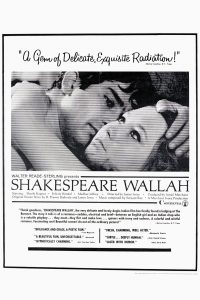Shakespeare-Wallah
Film directed by James Ivory; written by Ruth Prawer Jhabvala and James Ivory; produced by Ismail Merchant
In 1963, The Householder was the first film made by the collaboration of Merchant, Ivory and Jhabvala. The Divorce in 2003 was the last. Shakespeare-Wallah was their second film.
In some ways, it feels like the cinematic equivalent of the Rolling Stones. I can’t think of anything comparable outside of a small number of popular music groups. Certainly, we don’t see groups working together in the visual arts or literature. Those are mainly solitary ventures. Collectives may form, but they espouse similar ideas while wandering off by themselves to do their creative work. Theater companies don’t retain the same core of performers and writers.
So, no, I really can’t imagine how they did it any better than I can understand why Mick and Keith still talk to one another. They haven’t been neighbors for quite some time, so maybe that helps.
If you have heard the term “a Merchant and Ivory film,” then you have pre-conceived notions about what that means. These were the people with that Henry James obsession. You know, Ingmar Bergman in English and with less hysterics- exactly what you need when you’re home sick and need to doze on the sofa. After all, sleep through fifteen minutes here or there and what have you missed?
But then you start watching and people are doing stuff and things are happening and it’s just as surprising as when you actually crack open a Henry James novel. It almost encourages you to explore more Merchant-Ivory-Jhabvala work because they did a lot. They even did some before that sense of it being good for you attached to their names.

Of course, then you look at the attached image here. “A Gem of Delicate, Exquisite Radiation!”?? Does that really merit the exclamation point? The only time I expect to exclaim the word “radiation” is when things start glowing.
Really, the amount of damage done by marketing high-brow vs. low-brow could make you wonder if culture can be saved. If you’re in the given mood, then it’s the art for you.
So, I’ve always thought of Shakespeare-Wallah as a bit of an adventure film because it is about what happens to a family that travels around India trying to stage Shakespeare. Pretty much, that’s all you need to know and you can imagine how it goes from there. The father, mother and daughter in the movie are father, mother and daughter in real life and they really did this. Then their other daughter plays the… oh, just watch the movie.
Then, check out Bombay Talkie. After that, consider what the path must have been that led these people to become best known for the sort of costume period dramas that most people associate with Masterpiece Theater. If anything, you have to love the work if you’re going to keep working. Sometimes, I think the mistake is expecting the work to be something you can control.
What’s it all about?
You’ve Got to Check This Out is a blog series about music, words, and all sorts of artistic matters. It started with an explanation. 75 more to go.
New additions to You’ve Got to Check This Out release regularly. Also, free humor, short works, and poetry post irregularly. Receive notifications on Facebook by friending or following Craig.
Images may be subject to copyright.
